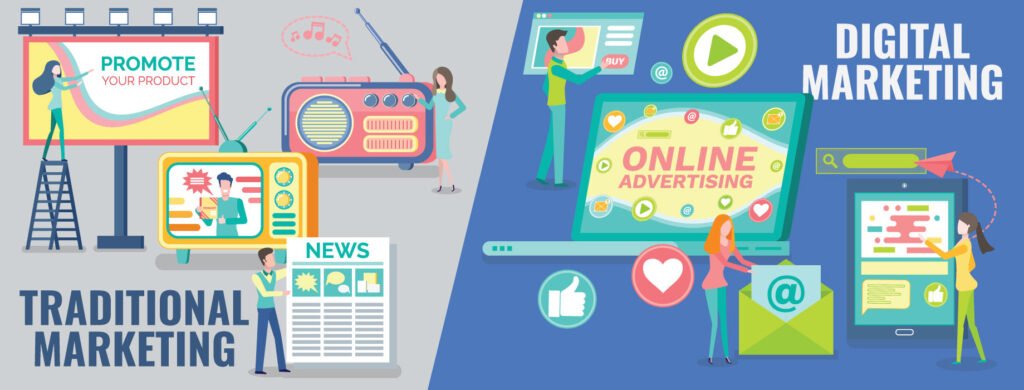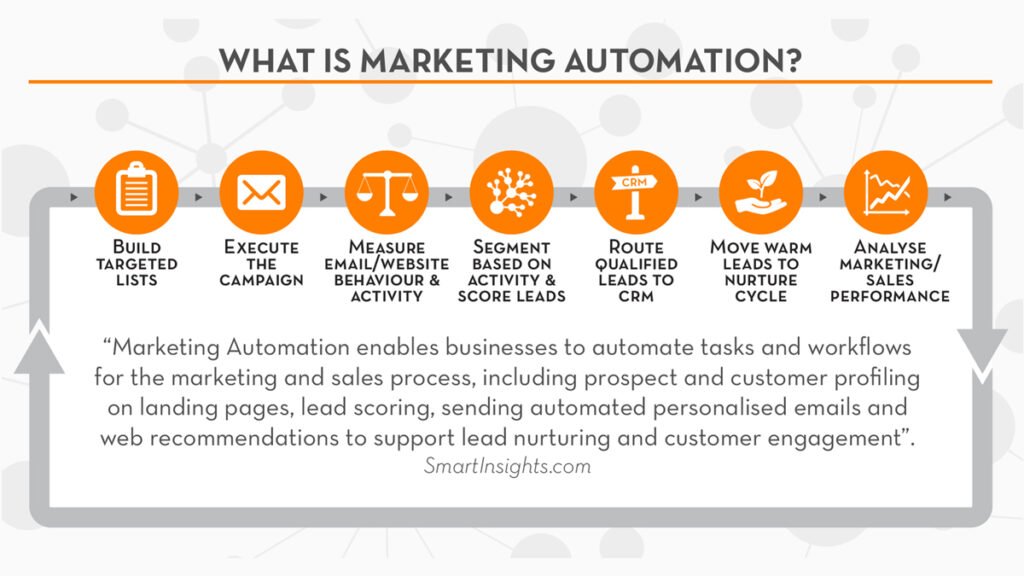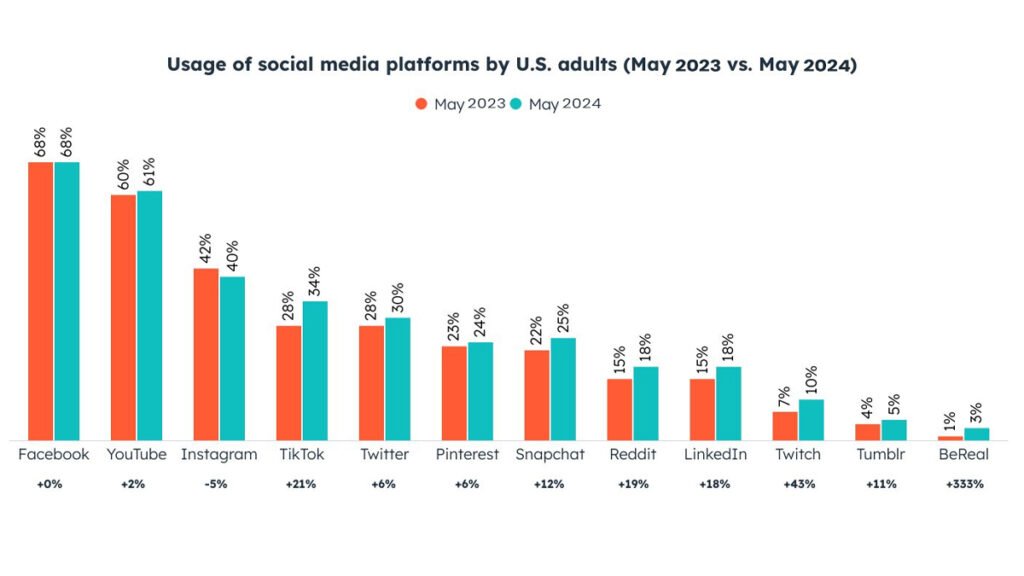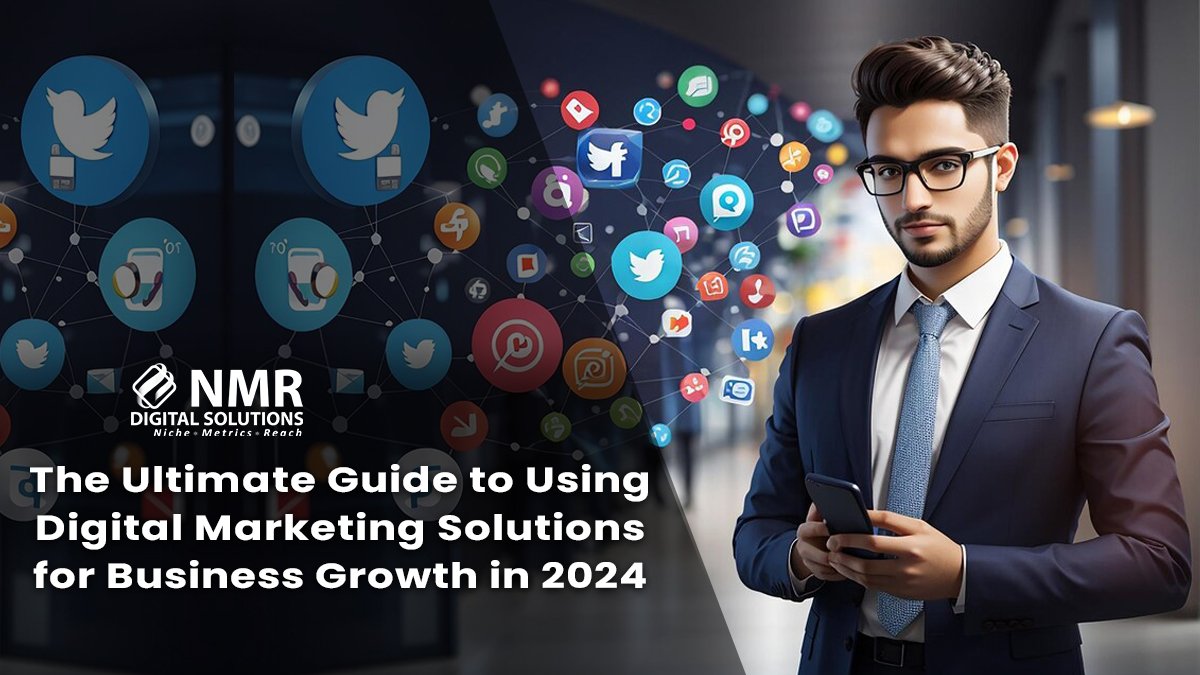Introduction
Digital marketing solutions play a crucial role in driving business growth in today’s fast-paced and technology-driven world. With the increasing reliance on digital platforms, businesses need to leverage these solutions strategically to stay competitive and capture the attention of their target audience.
In this guide, we will explore the various ways in which you can harness the power of digital marketing solutions to fuel the success of your business not only in 2024 but also beyond. Whether you are a small startup or an established enterprise, understanding and implementing effective digital marketing strategies is essential for sustainable growth.

Key Takeaways:
- Digital marketing solutions encompass a wide range of tools and techniques that help businesses connect with their audience, build brand awareness, drive website traffic, generate leads, and ultimately increase sales.
- By leveraging these solutions effectively, you can reach your target market more efficiently, enhance customer engagement, optimize marketing performance, and gain a competitive edge in the marketplace.
- In this guide, we will delve into different aspects of digital marketing solutions, including embracing change, data-driven decision making, adopting innovative technologies, and maintaining a customer-centric approach.
- By exploring these areas and implementing the strategies discussed, you will be well-equipped to navigate the evolving digital landscape and drive business growth in 2024 and beyond.
Understanding the Changing Landscape of Digital Marketing
The world of digital marketing is always changing, and marketers need to keep up if they want their businesses to succeed. It’s important to use new and creative strategies to navigate through this ever-changing landscape.

Technology’s Role
One of the main reasons for these changes is the rapid advancement of technology. As new technologies come out, marketers have to change their plans to include these new features and use them to their advantage. Things like artificial intelligence, virtual reality, and chatbots are becoming more popular, so it’s important for businesses to start using them if they want to stay ahead.
Customers’ Influence
Another reason why things are changing is because customers have more power now than ever before. With the internet, people can find information about anything they want with just a few clicks. This means that businesses have to work harder to get people’s attention and keep them interested.
Building Connections
One way that companies can do this is by building connections with their customers. This means creating personalized experiences for each person who visits your site or buys something from you online. It also means being active on social media platforms like Facebook or Twitter where potential buyers might be looking for recommendations or reviews on products similar to yours.
Providing Value
Finally, it means providing value through content marketing efforts such as blogging or video creation which helps educate potential buyers about what makes your product unique compared against competitors’ offerings.
To sum up, understanding and adapting to the changing world of digital marketing is crucial for business growth in 2024 and beyond. By keeping up with new technologies and finding ways to connect with customers on a personal level, businesses can set themselves apart from the competition and thrive in today’s digital marketplace.
Section 1: Embracing Change – Leveraging New Opportunities with Digital Marketing Solutions
The digital marketing landscape is always changing, and businesses must adapt and take advantage of new opportunities to stay ahead. In this section, we’ll look at how you can adjust your digital marketing strategies to make the most of current trends and technologies.
The Retirement of Third-Party Cookies and Its Implications for Digital Advertisers
One significant change that marketers need to address is the retirement of third-party cookies. These cookies have traditionally played a vital role in audience targeting and personalization. However, with increasing privacy concerns and regulatory changes, many web browsers are phasing out support for third-party cookies. As a result, digital advertisers must explore alternative strategies to ensure effective audience targeting and personalization.
Adopting Alternative Strategies for Effective Audience Targeting and Personalization
To navigate the post-third-party cookie era, marketers can adopt alternative strategies such as first-party data collection and contextual advertising. First-party data refers to the information collected directly from your customers, such as their purchase history or email preferences. By leveraging first-party data, you can gain valuable insights into your customers’ preferences and behaviors, allowing for more personalized marketing campaigns.
Contextual advertising focuses on displaying ads based on the context of the content being consumed by users. Instead of relying on user-specific data, contextual advertising targets ads based on the relevance to the webpage’s content or keywords. This approach ensures that your ads are displayed in relevant contexts while respecting user privacy.
Unlocking New Customer Segments Through Innovative Digital Approaches
Digital marketing solutions also provide opportunities to unlock new customer segments through innovative approaches. For example, you can leverage social media platforms to reach niche audiences that align with your business objectives. By identifying specific demographics or interests that resonate with your brand, you can tailor your messaging and content to engage these untapped customer segments effectively.
Creating Seamless Digital-First Experiences to Enhance Customer Engagement and Loyalty
In today’s hyper-connected world, customers expect seamless digital experiences across multiple touchpoints. To enhance customer engagement and foster loyalty, businesses need to prioritize creating digital-first experiences. This involves optimizing websites for mobile devices, streamlining the user journey, and providing personalized content that resonates with your target audience.
By embracing change and leveraging new marketing strategies, exploring alternative audience targeting and personalization methods, unlocking new customer segments through innovative approaches, and creating seamless digital-first experiences, you can position your business for growth in the ever-evolving digital marketing landscape.
Section 2: Data-Driven Decision Making in Digital Marketing
In today’s digital landscape, data-driven decision making is crucial for the success of your marketing campaigns. By using data to guide your choices, you can:
- Understand your customers better
- Tailor your marketing efforts to their preferences
- Identify opportunities for growth
- Optimize your marketing performance
- Increase your return on investment (ROI)
Here are some key points to consider:
1. Harnessing the power of data for informed decision making:
Data is essential for effective digital marketing strategies. It helps you understand how your customers behave, what they like, and how they interact with your brand. By analyzing this data, you can:
- Spot trends and patterns
- Discover new opportunities
- Personalize your marketing messages
For example, if you see a lot of people visiting your website from their phones, you can focus on improving the mobile experience and creating mobile-friendly ads.
2. The role of real-time analytics in optimizing marketing performance and ROI:
Real-time analytics allows you to monitor your marketing activities as they happen. It gives you instant feedback on how well your campaigns are performing. With real-time analytics, you can:
- Identify campaigns or channels that are underperforming
- Make quick adjustments to improve their results
For instance, if a social media campaign isn’t getting much engagement or conversions, you can change the message or target audience to make it more appealing.
3. Key metrics to track for evaluating the success of your digital initiatives:
To measure the success of your digital initiatives, it’s important to track relevant metrics that align with your business goals. Some key metrics include:
- Website traffic
- Conversion rates
- Click-through rates (CTRs)
- Customer acquisition costs (CAC)
- Customer lifetime value (CLV)
- Return on ad spend (ROAS)
By keeping an eye on these metrics over time, you can:
- Identify areas where you can improve
- Make data-driven decisions to optimize your strategies
4. The power of marketing analytics in driving business success:
Marketing analytics plays a vital role in leveraging data to drive business success. It enables you to gain deeper insights into your marketing efforts and make informed decisions based on the data at hand. By harnessing the power of marketing analytics, you can:
- Uncover actionable insights from large volumes of data
- Identify trends and patterns that lead to better decision making
- Optimize your strategies for maximum impact and growth
In summary, data-driven decision making is essential for digital marketing success. By using data, real-time analytics, and the power of marketing analytics, you can improve your marketing performance, ROI, and evaluate the success of your digital initiatives. Tracking key metrics helps you identify areas for improvement and make informed decisions to drive business growth in 2024 and beyond.

Section 3: Adapting to Change – Future-Proofing Your Business with Innovative Technologies
In today’s rapidly evolving market, businesses need to stay agile and responsive to maintain a competitive edge. This is where artificial intelligence (AI) in marketing comes into play, offering significant benefits for streamlined campaign management and personalized customer experiences.

Utilizing marketing automation tools powered by AI, such as AI models for small businesses, can transform your operations. By automating repetitive tasks like email marketing, social media posting, and ad placements, you free up valuable time for your team to focus on strategy and creativity. Moreover, AI has the capability to analyze large amounts of data to uncover valuable insights about consumer behavior and preferences, enabling businesses to deliver highly targeted and relevant content.
One of the key advantages of incorporating AI into your marketing strategy is the ability to offer immediate customer support through AI-powered chatbots. These chatbots not only improve the overall customer experience but also allow for personalized communication with your audience, leading to higher engagement and conversion rates.
By adopting these innovative technologies, you not only streamline your marketing processes but also unlock new potentials for your business. These technologies empower you to stay agile and responsive in a rapidly evolving market, ultimately future-proofing your business and gaining a competitive edge in 2024 and beyond.
Section 4: The Human Element – Balancing Technology with Customer-Centricity
Customer data and privacy compliance are essential considerations in the era of data-driven marketing. Maintaining trust and privacy is crucial for building strong relationships with customers. Striking the right balance between automation and human touch in your digital strategies is key to achieving this delicate equilibrium.
1. Maintaining Trust and Privacy
With the increasing reliance on customer data for personalized marketing, it’s vital to prioritize trust and privacy. Respecting customers’ data privacy concerns and complying with regulations such as GDPR and CCPA is non-negotiable. Transparent communication regarding data usage and ensuring robust security measures are fundamental in maintaining trust.
2. Striking the Right Balance
While leveraging innovative technologies like AI and marketing automation can enhance efficiency, it’s equally important to infuse a human touch into digital strategies. Personalized interactions, empathetic customer service, and authentic engagement play a pivotal role in fostering meaningful connections with your audience.
Balancing technology with customer-centricity involves aligning digital initiatives with ethical considerations and human empathy. By prioritizing privacy and infusing a human touch into your digital strategies, you can create a harmonious blend of technological advancement and customer-centric approach.

Conclusion
In 2024 and beyond, the role of digital marketing solutions in driving business growth cannot be overstated. As companies navigate through uncertainty and adapt to the changing landscape of digital marketing, the need to embrace innovative tactics and technologies becomes increasingly critical.
- The retirement of third-party cookies has compelled marketers to explore alternative strategies for audience targeting and personalization. This shift presents an opportunity to unlock new customer segments through creative digital approaches and to create seamless digital-first experiences.
- Data-driven decision making remains at the forefront of successful digital marketing strategies. Harnessing the power of data for informed decision-making and leveraging real-time analytics are essential for optimizing marketing performance and ROI.
- The integration of innovative technologies such as marketing automation tools and artificial intelligence has become imperative for future-proofing businesses. These tools not only streamline campaign management but also facilitate personalized customer experiences, driving marketing innovation and efficiency.
As businesses continue to balance technology with customer-centricity, trust, privacy, and maintaining a human touch in digital strategies will remain pivotal. Striking the right balance between automation and human interaction is crucial for fostering meaningful connections with customers in an era of hyper-connectivity. By embracing change, leveraging data-driven insights, adapting to innovative technologies, and prioritizing the human element, businesses can harness the full potential of digital marketing solutions to fuel their growth in 2024 and beyond.
